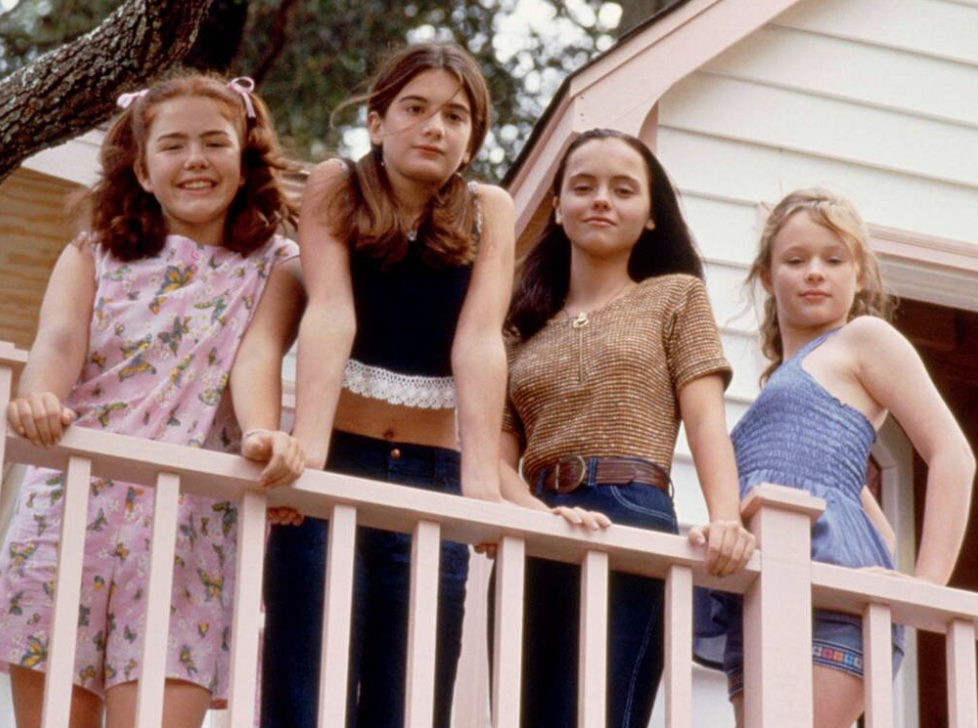As part of one of the “let’s throw female audiences a bone” category in the 90s, Now and Then (along with A League of Their Own in 1992 and The First Wives Club in 1996) was a rare breed in terms of offering up not only a female-centric cast, but also crew. Directed by Lesli Linka Glatter (a veteran of directing Twin Peaks episodes and, later, several for Gilmore Girls, Mad Men, True Blood and Pretty Little Liars), the script was written by I. Marlene King (the showrunner for Pretty Little Liars, hence their subsequent collaboration on the series), who addresses not only the unbreakable bonds of feminine solidarity, but also the vitriol that comes with constantly being told one is “lesser than” the opposite sex starting from an early age.
Filled with the instances of female rage that come with growing up in a world that one must gradually reconcile makes no sense, the narrative follows the thread of four childhood friends living in smalltown Shelby, Indiana at the dawn of Summer 1970. As is the rule when four women are displayed onscreen together, each must embody a certain archetype, therefore, Roberta (Christina Ricci) is the tomboy, Chrissy (Ashleigh Aston Moore, who died of a heroin overdose in 2007) is the prude, Samantha (Gaby Hoffman) is the intellectual and Tina a.k.a. Teeny (Thora Birch) is the harlot in training (yes, it sounds a lot like Sex and the City ripped off these tropes from this movie).
Their close kinship is wrought not only from living in the same cul-de-sac, so to speak, but from being at constant war with the Wormer brothers, a cabal of Aryan boys who seem to perfectly embody the patriarchy with their constant and unjustified antagonism toward the girls. Led by the eldest, Scott (Ricci movie staple Devon Sawa), the quartet is faced not only with the issue of perpetually coming to literal blows with the brothers, but also the revelation that the adults in their life have no idea the fuck they’re doing.
For Roberta, the discovery that her mother, who died when she was four, experienced great pain in a car accident, is part of what fuels her already rarely dormant contempt for just about everyone, particularly the boys in town who try to tell her what she can and can’t do (like play softball, tipping her off to come at the guy who says “girls can’t” and pummel him until a crowd removes her).
As for Samantha, dealing with her anger over her parents’ divorce and her mother’s sudden interest in a new man named Bud (Hank Azaria) causes her to further retreat into her self-made world of science fiction–paired, of course, with the occasional seance. It is the latter hobby that finds the four girls in the cemetery summoning the spirit of “Dear Johnny,” who passed away at age twelve, asking him how he died so young. From this moment forward convinced they’ve summoned his spirit, they become determined to find out who killed him. The dark undertones of this thread extend to the macabre fetish Roberta has for faking her own death, a fancy that incites Chrissy (who is closer to Roberta, while Samantha is closer to Teeny) to punch her in the face after she pretends to drown in the lake. The fact that their emotional frustration so often comes out in physical form, in turn, spurs on even more rage as they’re expected by their parents and male peers to “act like ladies.”
Mocked for displaying so-called masculine behavior, a bully goads Roberta with the line, “Why don’t you go home and play with your dolls?” But Roberta would prefer being seen as boyish to the alternative. Hence, while Teeny wishes nothing more than for her “growth” (that is, in the chest department) to accelerate, Roberta spends extra time each day taping down her breasts to avoid being noticed in a sexual light. For it is being given attention in this way that makes men even further believe they can do whatever they want, that congenital sense of entitlement increasingly triggered by the female form as both sexes grow older.
In addition to their emotions going haywire as a simple result of puberty, Samantha comes to the epiphany that, “As we grow older, it becomes difficult to just believe. It’s not that we don’t want to, but too much has happened and we can’t.” And much does in that summer of ’70, with Teeny perfectly summing up all the trauma in her premature jaded wisdom (the kind that’s a requisite part of having absentee parents) with, “It’s normal for things to be shitty.” But, like cum, that doesn’t make it any easier to swallow. Hence, the manifestation of indignation and furor into physical violence throughout the majority of the film.
Although there was briefly talk of rebooting it as a TV series with I. Marlene King at the helm (understandably, she stopped writing movies after 2006’s Just My Luck starring Lindsay Lohan), the free-flowing apoplexy exhibited at its best by the original cast (particularly Ricci as Roberta) simply wouldn’t come across as well in the climate of now, when a woman is, more than ever, expected to keep her emotions in check and instead display them through well-though out speeches supported by documentation and statistics. Lest she, as usual, get accused of being on her period.






















